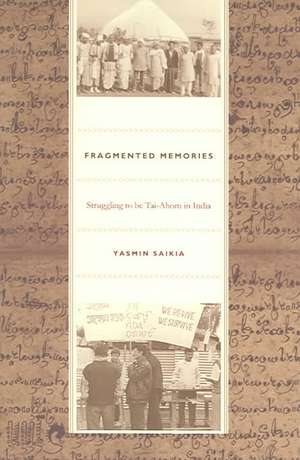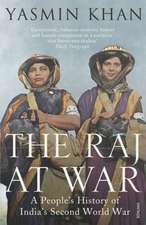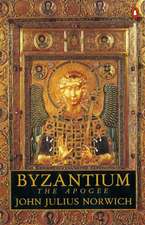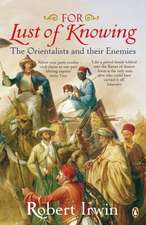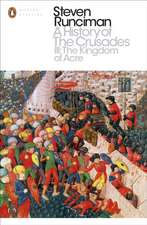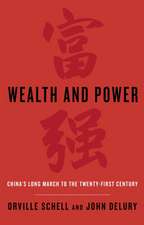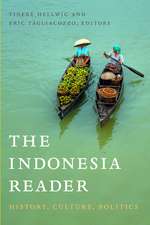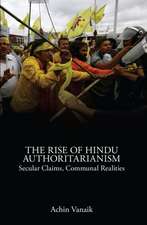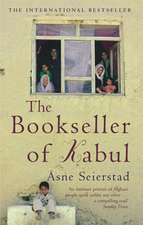Fragmented Memories – Struggling to be Tai–Ahom in India
Autor Yasmin Saikiaen Limba Engleză Paperback – 8 noi 2004
Preț: 300.83 lei
Nou
Puncte Express: 451
Preț estimativ în valută:
57.56€ • 60.25$ • 47.91£
57.56€ • 60.25$ • 47.91£
Carte tipărită la comandă
Livrare economică 31 martie-14 aprilie
Preluare comenzi: 021 569.72.76
Specificații
ISBN-13: 9780822333739
ISBN-10: 0822333732
Pagini: 352
Ilustrații: 1 b&w photo, 3 maps
Dimensiuni: 152 x 234 x 15 mm
Greutate: 0.49 kg
Ediția:New.
Editura: MD – Duke University Press
ISBN-10: 0822333732
Pagini: 352
Ilustrații: 1 b&w photo, 3 maps
Dimensiuni: 152 x 234 x 15 mm
Greutate: 0.49 kg
Ediția:New.
Editura: MD – Duke University Press
Cuprins
Acknowledgments ix
Preface xi
Introduction Locating Tai-Ahom in Assam: The Place and People 1
Part One
Historical and Comparative Perspectives on Identity: Indian, Assamese and Tai-Ahom
1. Identification in India 37
2. Colonial Origins of Ahom 77
3. The Memory of the Local: The Stories the Buranjis Tell 113
Part Two
Tai-Ahom: A Language and Culture of Emotion
4. Rationalizing a History 147
5. Performance and Politics of Tai-Ahom 177
6. There Was No Plot in the People’s Struggle 225
Conclusion The Past and Present: Connecting Memory, History and Identity 251
Epilogue 267
Notes 269
References 301
Index 319
Preface xi
Introduction Locating Tai-Ahom in Assam: The Place and People 1
Part One
Historical and Comparative Perspectives on Identity: Indian, Assamese and Tai-Ahom
1. Identification in India 37
2. Colonial Origins of Ahom 77
3. The Memory of the Local: The Stories the Buranjis Tell 113
Part Two
Tai-Ahom: A Language and Culture of Emotion
4. Rationalizing a History 147
5. Performance and Politics of Tai-Ahom 177
6. There Was No Plot in the People’s Struggle 225
Conclusion The Past and Present: Connecting Memory, History and Identity 251
Epilogue 267
Notes 269
References 301
Index 319
Recenzii
Yasmin Saikia opens a new door to margins of national power, memory, and history, where most people live today. Her fresh voice and engaging prose weave together high theory, political engagement, textual expertise, ethnographic detail, personal experience, and a sweeping command of history in South Asia from medieval times to the present, with critical wisdom and graceful poignancy. Her history is more than history. It is an erudite evocation of the multiple pasts of Tai Ahom people struggling to invent themselves in contemporary Assam, modern India, and a world of national minorities. David Ludden, author of An Agrarian History of South Asia" . . . this impressive contribution to understanding the links between Asian regionsdemonstrates that rivals can come unexpectedly. Saikia's account of social ambiguities shoudlserve to inspire other sophisticated scholarship on northeastern India and itspeople."--Contemporary South Asia, 14(3) September 2005
"Yasmin Saikia opens a new door to margins of national power, memory, and history, where most people live today. Her fresh voice and engaging prose weave together high theory, political engagement, textual expertise, ethnographic detail, personal experience, and a sweeping command of history in South Asia from medieval times to the present, with critical wisdom and graceful poignancy. Her history is more than history. It is an erudite evocation of the multiple pasts of Tai Ahom people struggling to invent themselves in contemporary Assam, modern India, and a world of national minorities." David Ludden, author of An Agrarian History of South Asia " ... this impressive contribution to understanding the links between Asian regions demonstrates that rivals can come unexpectedly. Saikia's account of social ambiguities shoudl serve to inspire other sophisticated scholarship on northeastern India and its people."--Contemporary South Asia, 14(3) September 2005
"Yasmin Saikia opens a new door to margins of national power, memory, and history, where most people live today. Her fresh voice and engaging prose weave together high theory, political engagement, textual expertise, ethnographic detail, personal experience, and a sweeping command of history in South Asia from medieval times to the present, with critical wisdom and graceful poignancy. Her history is more than history. It is an erudite evocation of the multiple pasts of Tai Ahom people struggling to invent themselves in contemporary Assam, modern India, and a world of national minorities." David Ludden, author of An Agrarian History of South Asia " ... this impressive contribution to understanding the links between Asian regions demonstrates that rivals can come unexpectedly. Saikia's account of social ambiguities shoudl serve to inspire other sophisticated scholarship on northeastern India and its people."--Contemporary South Asia, 14(3) September 2005
Notă biografică
Yasmin Saikia
Textul de pe ultima copertă
"Yasmin Saikia opens a new door to margins of national power, memory, and history, where most people live today. Her fresh voice and engaging prose weave together high theory, political engagement, textual expertise, ethnographic detail, personal experience, and a sweeping command of history in South Asia from medieval times to the present, with critical wisdom and graceful poignancy. Her history is more than history. It is an erudite evocation of the multiple pasts of Tai-Ahom people struggling to invent themselves in contemporary Assam, modern India, and a world of national minorities."--David Ludden, author of "The New Cambridge History of India: An Agrarian History of South Asia"
Descriere
A study of identity and its connection to memory, focusing on the history of community identity formation among the Tai-Ahom in Assam.
